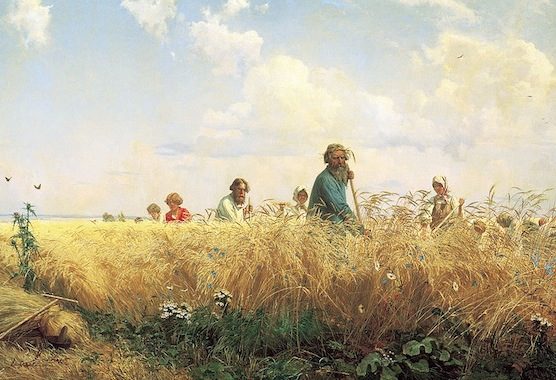Meaningful Landscapes

I was reading Mikhail Bulgakov’s letters Sunday afternoon—by the fire with cold rain coming down outside—and I let out spontaneously to everyone sitting in the living room that I loved Russian literature. The characters are always so refreshingly foreign, the plots are driven by ideas (as all plots are, of course, but to varying degrees), and the landscapes—dark and foreboding or light and hopeful—are always full of meaning.
It’s this last part, in particular, that I often enjoy most. I don’t care for portraiture—the subtle, delicate image for the sake of the subtle, delicate image. What I like are trees, wind, snow, mud, and glimmering hills freighted with significance—in short, landscapes that reflect the soul or point it to some beyond. And few national writers do this better than the nineteenth and early twentieth century Russians.
There are Tolstoy’s harvests:
The harvesting was in full blast. The immeasurable, bright yellow fields was closed in only on one side by a tall bluish forest which then appeared to me as a most distant and mysterious place, beyond which either the world came to an end or uninhabitable countries began.
Dostoevsky’s Neva:
He clutched the twenty kopecks in his hand, walked about twenty steps, and turned his face to the Neva, in the direction of the palace. There was not the least cloud in the sky, and the water was almost blue, which rarely happens with the Neva. The dome of the cathedral, which is not outlined so well from any other spot as when looked at from here, on the bridge, about twenty paces from the chapel, was simply shining and through the clear air one could make out each of its ornaments distinctly. The pain from the whip subsided, and Raskolnikov forgot about the blow; one troublesome and not entirely clear thought now occupied him exclusively. He stood and looked long and intently into the distance; this place was especially familiar to him. While he was attending the university, he often used to stop, mostly on his way home, at precisely this spot (he had done it perhaps a hundred times), and gaze intently at the indeed spectacular panorama, and to be surprised almost every time by a certain unclear and unresolved impression. An inexplicable chill always breathed on him from this splendid panorama; for him the magnificent picture was filled with a mute and deaf spirit…The fact alone that he had stopped at the same spot as before already seemed wild and strange…He even felt almost like laughing, yet at the same time his chest was painfully constricted. It was as if he now saw all his former past, and former thoughts, and former tasks, and former themes, and former impressions, and this whole panorama, and himself, and everything, everything, somewhere far down below, barely visible under his feet…It seemed as if he were flying upwards somewhere, and everything was vanishing from his sight…
And Turgenev’s countryside:
Fields upon fields stretched all along to the very horizon, now sloping gently upwards, then dropping down again; in some places woods were to be seen, and winding ravines, planted with low, scanty bushes, recalling vividly the representation of them on the old-fashioned maps of the times of Catherine. They came upon little streams too with hollow banks; and tiny lakes with narrow dykes; and little villages, with low hovels under dark and often tumble-down roofs, and slanting barns with walls woven of brushwood and gaping doorways beside neglected threshing-floors; and churches, some brick-built, with stucco peeling off in patches, others wooden, with crosses fallen askew, and overgrown grave-yards. Slowly Arkady’s heart sunk. To complete the picture, the peasants they met were all in tatters and on the sorriest little nags; the willows, with their trunks stripped of bark, and broken branches, stood like ragged beggars along the roadside; cows lean and shaggy and looking pinched up by hunger, were greedily tearing at the grass along the ditches. They looked as though they had just been snatched out of the murderous clutches of some threatening monster; and the piteous state of the weak, starved beasts in the midst of the lovely spring day, called up, like a white phantom, the endless, comfortless winter with its storms, and frosts, and snows…
Not to mention Pasternak’s dark forests of white snow, Chekhov’s cherry orchards or Bulgakov’s winters.
In The Art Instinct, Denis Dutton discusses our preference for landscapes with “with water, people, and animals” and argues that it is rooted in our ancestors’ search for food and safety.
I’d say it’s rooted in an entirely different kind of search.
Comments